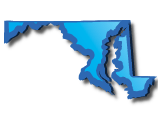Maryland Rebates and Incentives Summary

Though small, Maryland has emerged as a leader in solar policy. In 2007, it passed the EmPOWERing Maryland Act, which required a reduction in the state’s overall energy use through efficiency and alternative power. State officials expect to meet the Act’s 15% goal by the end of this year. In 2012, the state enacted a goal of 2% solar capacity by 2020. Currently, the state ranks twelfth in the nation in installed solar capacity.
This push towards renewable energy is likely due to the fact that Maryland has some of the most expensive electricity prices in the country. Currently, the majority of its electricity is generated by coal and nuclear energy, and the small state must import approximately 30% of its electricity. Maryland’s solar policy has remained popular, with 2014 seeing a 95% increase in the amount of capital invested in solar energy production.
Solar makes sense as a renewable energy for Maryland because it gets an average of about 5 kilowatt hours per square meter of sunlight per day, which is plenty for installing a photovoltaic (PV) or other solar system. The state has adopted a diverse range of incentives for residential and commercial solar installation, making it likely that it will meet its policy goals.
, full_html